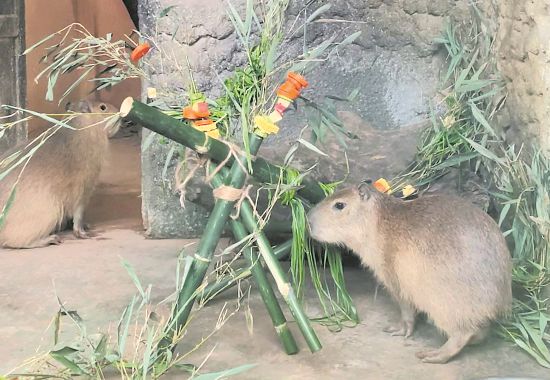"Steady" guy: Emotional stability weighs up to 70 kilograms.

A capybara sunbathing.
Emotional stability, "Buddhism", "social flower" in the animal kingdom … With the "top flow" tags above the head, there is an animal that is all over the Internet in 2023, and its related expression packs, short videos and peripheral products are sought after by countless young people. It is "Capibala"-capybara.
Capibala is the homonym of Capybara, the English name of capybara. It is always calm and emotionally stable, which provides inspiration for many young people to deal with real problems such as life pressure. Moreover, capybara has many friends in the animal kingdom, including pelicans, turtles, ducks and even crocodiles …
Recently, Chengdu Zoo held a parent-child activity of "Exploring the Life of Capibala". The reporter saw at the scene that everyone not only saw three newly arrived capybara, but also learned about the daily life behind their "Buddha system" in the process of making surprise gifts for capybara together.
Neighborhood harmony
The "social flower" in the animal kingdom is worthy of the name.
Last weekend, in the Children’s Animal Park of Chengdu Zoo, we saw three new "residents" who had been in the park for less than a year. They are always mistaken for "big mice" by tourists, with large and wide heads, small eyes and ears, and their personalities are indeed as netizens said: emotional stability, "Buddhism" and being kind to their neighbors.
The capybara Niuniu and Dudu are sunbathing in the outfield. They lie on the ground in tandem, half squinting, enjoying the warm winter sun calmly and comfortably. And the "neighbor" beside them, the black-tailed groundhog, looks around for a while, digs holes to play for a while, moves quietly with the adjacent capybara, and the neighborhood is harmonious.
On the other side of the room, there is a bigger capybara taking a nap. Its front paws are resting on its chin, its small head is tilted to one side, and a plate with leftover food is placed in front of it. It seems that it has had a full meal and should not dream of "hunger". According to Xu Yan, the breeder, this relatively "curtilage" capybara is called Tonton, and its personality is more sensitive, so a Sukada tortoise was specially arranged to keep it company.
No natural enemies
The maximum weight can reach more than 70 kilograms.
So, what is the secret of capybara’s emotional stability? Xu Yan said that capybara has little pressure to survive and almost no natural enemies. "The origin of capybara is in South America, where there are almost no large mammals. Although the capybara may be targeted by cougars and leopards, the larger capybara can weigh up to more than 70 kilograms, which is basically difficult to be hunted. Even if it is in danger, capybara can avoid hunting by quickly jumping into the water. "
In addition, as a social animal, capybara is a group of about 10 to 30 in the wild, which is highly socialized. Living in the "comfort zone" of the food chain, the mental state of capybara is particularly stable.
The capybara always has many animal friends around it because of its tolerant personality and nutritious feces. Xu Yan explained that capybara is a herbivore, and its feces are rich in nutrients. "And because of its own fermentation, these nutrients are easily absorbed by other small animals."
At the same time, as a herbivore, capybara poses no threat to many animals, is inclusive and has the function of "keeping watch" in the community. Therefore, there are always many small animals that eat the same grass around the capybara.
Parent-child cooperation
Make a small gift for capybara.
At the scene of the parent-child activity of "Exploring the Life of Capibala", parents and children were first divided into four groups, and bamboo, ryegrass, apples, corn and other foods were made into rich gifts to improve the food for capybara. The members of each group work together, and the parents fix the bamboo with hemp rope to form a bamboo frame; the children put the apples and corn cut into small pieces into strings, and then insert the bamboo frame; finally, decorate with rye vegetables, and the small gift is made.
The staff said that capybara is a complete "vegetarian" and loves to eat ryegrass, apples, corn, etc. "So in this activity, we specially prepared the ingredients that capybara likes to eat to make rich gifts, which can also increase their eating pleasure."
During the activity, everyone also learned about the daily life of capybara-"sunbathing" in winter and "bathing" in summer. According to reports, in winter, capybara likes to stay in warm places. For this reason, the park installed floor heating for the inner room of capybara. When the sun is shining, they will lie outdoors in the sun. In summer, capybara likes to soak in water. "Because their skin has no sweat glands, in order to prevent sunburn, thermal digestion, heatstroke and mosquito bites in summer, they must soak in water." The staff said. (Chengdu Daily Jinguan journalist Zhu Xinyue Wen/map)